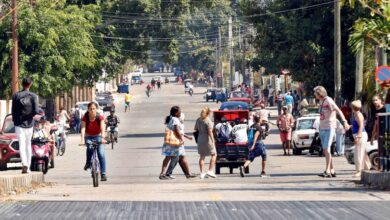How much did natural disasters cost in 2017?
Last year will go down in history as the year that managed to beat 2005 in billions of dollars in economic losses that could have been avoided
With a figure that exceeds 306 billion US dollars, 2017 is located above 2005 with 215 billion in economic losses for something that "has been mistakenly called natural disaster", according to the expert in environmental management and prevention of risk, Gustavo Wilches Chaux.
It is known that starting from false premises only leads to wrong conclusions, so Wilches Chaux says it is wrong to talk about natural disasters, "when we confuse the natural phenomenon with the disaster, it prevents us from seeing its true causes and therefore avoids act properly, also avoids identifying those responsible for a disaster, because often the cause of a disaster is neither ignorance nor natural causes, decisions are taken wrong".
The scientific journal Nature Climate Change published the compilation of 27 predictive models through research conducted by the University of Science and Technology of Southern Shenzhen and led by Chang-Eui Park, PhD, which clearly states the emergency by the advance of the desertification in the world if the temperatures increase of 1,5 to 2 degrees centigrade above pre-industrial levels.
The planet could dry up between 24 and 32% putting at risk the lives of millions of species that make up biodiversity around the world. The food security of hundreds of millions of people would be at serious risk, as well as the supply of drinking water. Also, another consecuence is the increase in the possibility of forest fires.
Semi-arid regions of Central and South America would be some of the most affected, adding an advance of progressive desertification that jeopardizes the economy of these regions as well as the lives of their citizens.
"Colombia has been mentioned as one of the three countries most vulnerable to climate change, it seems absurd, because we have a huge amount of comparative advantages, different sources of water, the moorlands that, if protected, may have a greater capacity of adaptation than if we devote ourselves to destroying them", emphasizes the expert in environmental management and risk prevention.
The natural events that are linked to natural disasters hit the lives of the Americans, the inhabitants of the Caribbean and part of Central America, and of course also hit their finances in a considerable way.
According to a study by ECLAC, "for every dollar invested in risk prevention, approximately seven are left to spend on disaster relief". This gives a clear sign of the possibility that the planet has to avoid a natural event that has become disaster.
"In 1985, a volcanic eruption in Colombia, a natural event, killed 25 thousand people, and became a disaster because the avalanche of mud and stones was found on its way to the city of Armero. tHad there been no such city in that place, there would not have been a disaster, it would have been a natural event", says Wilches Chaux, adding that "that is why one of the variables on which environmental management must work is planning the territory".
Regarding investment in disaster risk prevention "humanity has been advancing, we are getting better at rescuing the shipwrecked, but every time we generate more conditions for shipwrecks", considers the expert in the prevention and attention of disasters.
The disaster response teams have specialized, and the experience and expertise has been increasing as more natural events happen every day. Due to conditions such as the absence of land management, the deterioration of ecosystems and the changes generated in the Earth's atmosphere, among others, these events turn IGNORE INTO disasters. More resources are allocated to increase the budgets of emergency response teams, rescuers, firefighters, Red Cross, and even the military and police forces of different countries in Latin America have their own divisions for disaster relief. However, it seems that the number of victims increases in parallel with the increase in the budget, which leads one to think that this type of situation cannot be solved with money, or at least not investing it in such way.
The Great Smog of 52
One of the most recpgnized episodes of the natural disaster history in the world was the London winter of 1952, when Prime Minister Winston Churchill communicated to the British people words of encouragement: "Only God can raise the fog, but I, the prime minister, am in favor of reducing the suffering is why I am committed to making more money available immediately for hospital staff, more money for equipment and a public investigation, complete and independent to know the cause of the contamination, so that this calamity will never come back to happen".
The fog that Churchill refers to was a large cloud of smoke from the combustion of poor quality coal in the chimneys of homes and offices that faced the coldest winter in history until that time. The fog of 52 left a balance of 12 thousand lives and more than 100 thousand with respiratory affections and it was not a natural disaster or an "act of God", as Churchill called it at that time, it was an act of man, as well as climate change.
Climate change and the causes of natural events
Previously there was speculation about the responsibility of Climate Change on the increase in intensity and strength of natural events such as hurricanes. However, the doubt was resolved thanks to research at Pennsylvania State University in the country whose president denies the existence of climate change. Using the Clausius-Clapeyron equation, it is shown that for every half degree Celsius that increases the temperature of the atmosphere, humidity increases by approximately 3%. If anyone still wonders if climate change sharpens the strength, intensity, and frequency of hurricanes, the answer is in the temperature of the Gulf of Mexico, which is now more than half a degree above the historical average and was the scene of several hurricane events like the one that shook the city of Houston in 2017. "Climate change means that when we have an event like Harvey, the amounts of rain are probably higher than they would have been otherwise", the UN spokesperson in Geneva stated.
Risk prevention "are not additives that are put to development", says Wilches Chaux, "sadly I have seen how some risk management tools for climate adaptation are understood as the airbag that inflates in the car at the time of having an accident and at the same time the budget for the maintenance of the car we destine it to the alcoholic beverages for the driver".
Perhaps, according to the concepts enunciated by the UN, ECLAC and experts such as Gustavo Wilches Chaux, if 43 billion dollars had been invested in ecosystem restoration, avoiding deforestation, combating desertification, and changing consumption habits in the communities, governements could have avoided spending 306 billion dollars in losses caused by disasters that are not natural but propitiated by the human race.
Latin American Post | Alberto Castaño Camacho
Copy edited by Laura Rocha Rueda





